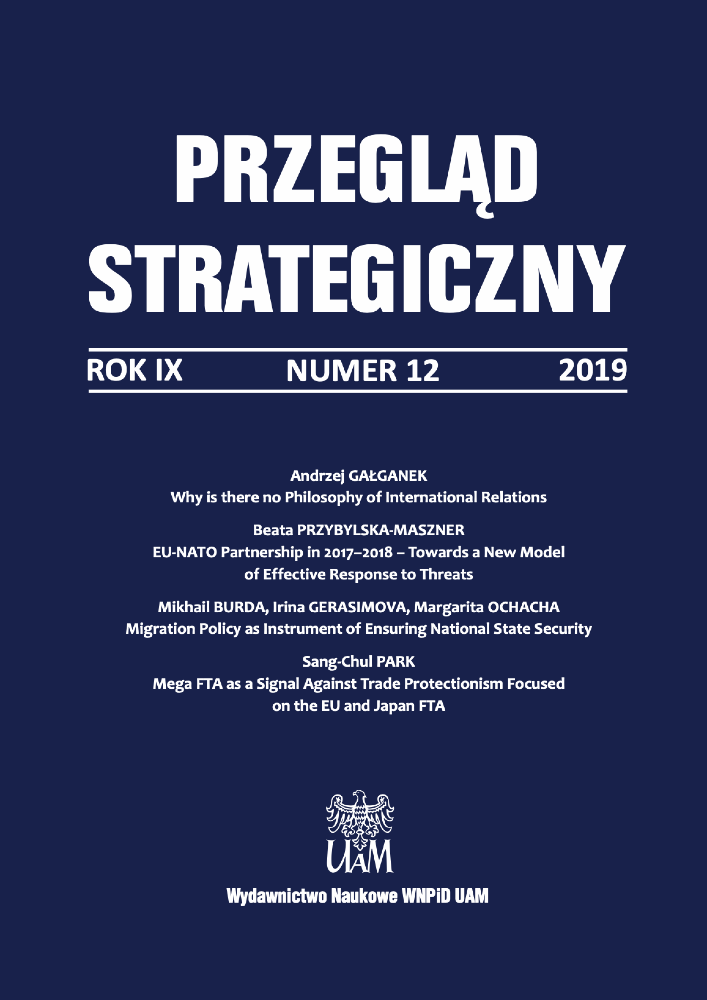Abstract
One of the basic human needs is safety. The article assumes that the consumer society must ful- fill this need. The aim of the analysis of scientific research on consumer society and its ideology is to try to answer the question: how is this happening? It is difficult to answer the above question clearly. It can be said, however, that a consumer- oriented market may be wrong, but it always cares about the consumer’s good. This is the basic message concerning safety that is to be provided to consumers. How does this safe world of the consumer look like? Building a safe world is a utopia. The presented sentence is not a discovery and it does not bring much. However, if there is no safe world, why is it so important and why are there areas of the world in which for many decades there have been no wars? You cannot look at all of Europe in this way. And yet the richest countries in the world are waging war not in their own territory, but going beyond it, they are guarding global security. It is sometimes difficult to say whether these activities were necessary for safety. One should rather ask what type of security we meant. Therefore, a justified question is whether in the consumer society security of financial turnover is not the most important one.
References
Appadurai A. (1986), Commodities and the Politics of Value, w: The Social Life of Things: Commodities in Cultural Perspective, (red.) A. Appadurai, Cambridge University Press, Cambridge.
Appadurai A. (2005), Nowoczesność bez granic. Kulturowe wymiary globalizacji, przeł. Z. Pucek, Universitas, Kraków.
Baudrillard J. (2005), Symulakry i symulacja, przeł. S. Królak, Wydawnictwo Sic!, Warszawa.
Bauman Z. (2007), Szanse etyki w zglobalizowanym świecie, Wydawnictwo Znak, Kraków.
Bell D. (1998), Kulturowe sprzeczności kapitalizmu, przeł. S. Amsterdamski, Wydawnictwo Naukowe PWN, Warszawa.
Bloch M., Parry J. (2005), Pieniądz i moralność wymiany, w: Badanie kultury, Elementy teorii antropologicznej, pod red. M. Kempnego, E. Nowickiej, Wydawnictwo Naukowe PWN, Warszawa.
Bourdieu P. (2005), Dystynkcja. Społeczna krytyka władzy sądzenia, przeł. P. Biłos, Wydawnictwo Naukowe Scholar, Warszawa.
Campbell C. (2004), I Shop Therefore I Know That I Am, w: Exclusive Consumption, (red.) K.M. Ekstrom, H. Brembeck, Berg, Oxford.
Godelier M. (2010), Zagadka daru, przeł. M. Höffner, Wydawnictwo Uniwersytetu Jagiellońskiego, Kraków.
Harvey D. (1998), The Conditions of Postmodernisty, Basil Blackwell, Oxford.
Kuligowski W. (2007), Antropologia współczesności: wiele światów, jedno miejsce, Universitas, Kraków.
Pieszak E. (2003), Trzy dyskursy o spotkaniu z Innym, Wydawnictwo PTPN, Poznań.
Rewers E. (2005), Post-polis. Wstęp do filozofii ponowoczesnego miasta, Universitas, Kraków.
Rorty R. (1996), Przygodność, ironia i solidarność, przeł. J. Pomowski, Wydawnictwo Spacja, Warszawa.

